Key takeaways:
- Effective indexing significantly enhances database performance, reducing query response times and improving resource efficiency.
- Understanding the trade-offs of indexing is crucial; while it speeds up data retrieval, excessive indexing can hinder data insertion and updates.
- Regular performance analysis and adjustments to indexing strategies are essential for maintaining optimal database functionality and ensuring user satisfaction.
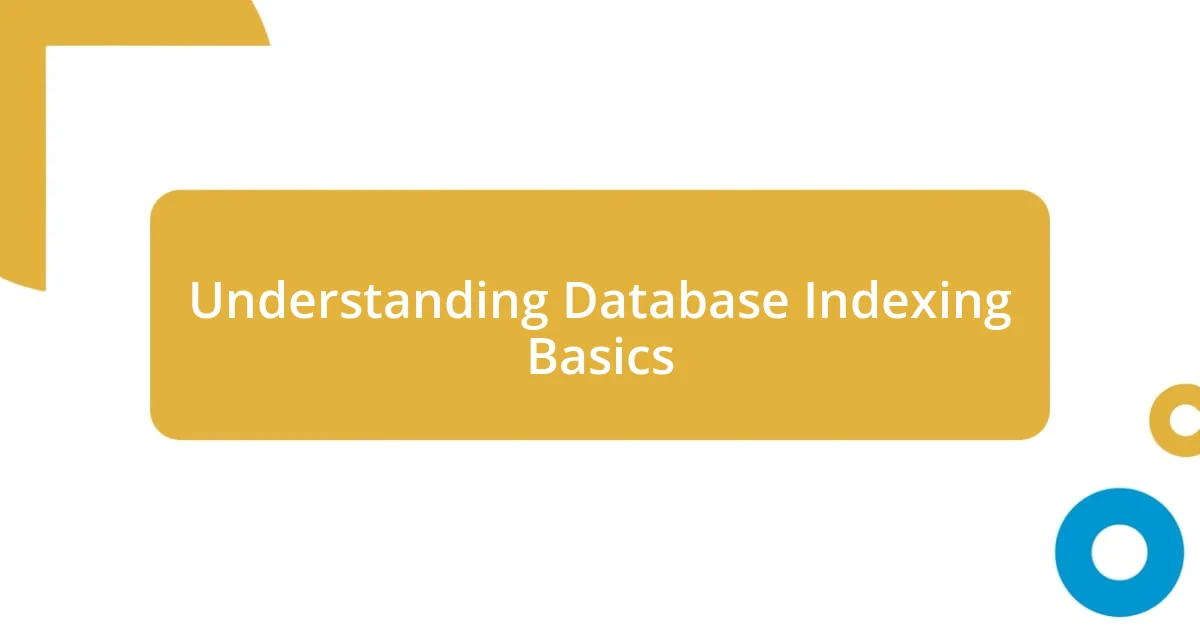
Understanding Database Indexing Basics
When I first dove into the world of database indexing, it felt like uncovering a hidden treasure. The basics of indexing are quite simple: think of an index as a roadmap for your database. It helps SQL queries find the right data much faster, which can be a game-changer for performance, especially when dealing with large datasets.
As I started to implement indexes, I quickly learned the difference between unique and non-unique indexes. Unique indexes ensure that no two rows have the same value in a specific column, while non-unique indexes allow for duplicates. It’s fascinating how a simple choice can affect the speed and efficiency of your queries. Have you ever had a moment where a small tweak made a huge impact? That’s exactly what happened to me when I realized how valuable a well-structured index could be.
Moreover, it’s essential to remember that indexing comes with trade-offs. While it can significantly speed up data retrieval, it can also slow down data insertion and updates. I recall an instance when I was so eager to optimize querying that I neglected the impact on write performance. This duality of indexing highlights why understanding the basics is crucial—just because indexing improves performance in one area doesn’t mean it’s always the best choice overall. Balancing these aspects is key to effective database management.
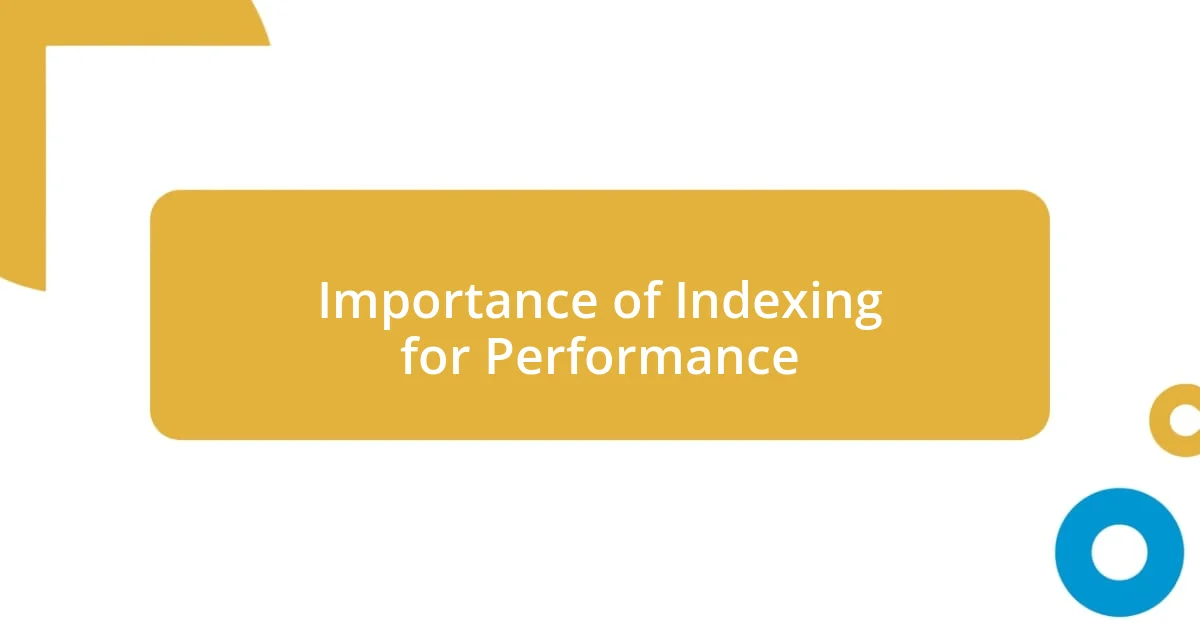
Importance of Indexing for Performance
The importance of indexing for performance cannot be overstated. When I first began indexing, I underestimated its impact. After implementing a few indexes, I witnessed a dramatic decrease in query response times. It was exhilarating to see how swiftly data could be retrieved, particularly during high-demand periods. This was a pivotal moment for me, showing that the right index can transform database performance.
- Enhanced speed: Indexes significantly reduce the time needed to locate and retrieve data.
- Improved efficiency: They streamline queries, making them less resource-intensive.
- Scalability: Well-structured indexing prepares your database for future growth as data volumes increase.
- Reduced server load: Efficient indexing decreases the workload on your database server, leading to better performance under stress.
There’s nothing quite like the feeling of optimizing a complex query and watching it execute with lightning speed. It’s one of those small victories that feels monumental, reminding me why I’m so passionate about database management. When your database is running smoothly, you can focus on what really matters—using the insights from your data to drive informed decisions.
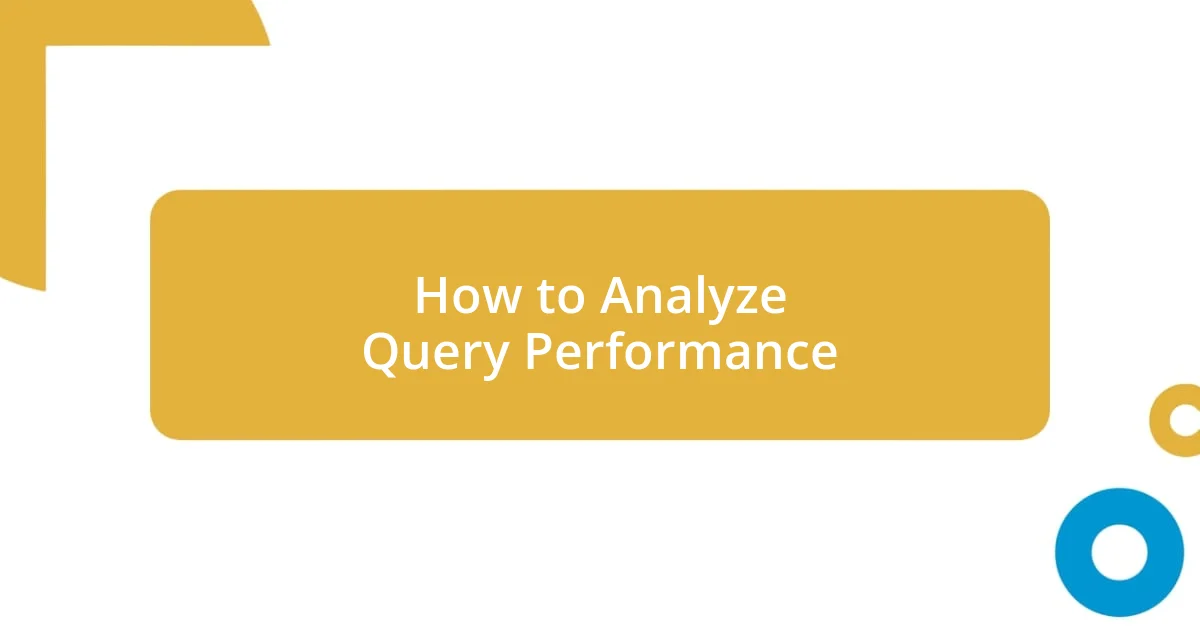
How to Analyze Query Performance
It’s crucial to dive into query performance analysis to pinpoint exactly where improvements can be made. I often start by using execution plans. This tool reveals how the database engine processes a query and highlights potential bottlenecks. Just the other day, I was analyzing a particularly sluggish query and discovered it was performing a full table scan instead of using an index. As soon as I adjusted the query, the difference was night and day.
In my experience, metrics like response time and resource usage play a significant role in evaluating performance. I typically look at how long a query takes to complete and how much CPU and memory it consumes. It’s enlightening to compare these metrics before and after implementing indexing changes. I remember a time when optimizing a query led to a surprising reduction in resource consumption—I felt like a conductor leading an orchestra, where every element finally fell into harmony.
Lastly, I encourage conducting a regular performance review. Consider using tools to monitor your database over time; this not only helps in identifying slow queries but also assists in understanding how the overall performance evolves. Time and again, I’ve noticed that proactive analysis prevents future slowdowns and keeps my databases in top shape. Have you experienced any performance dips? Regular analysis might just be the answer you need.
| Analysis Method | Description |
|---|---|
| Execution Plans | Visual representation of query execution, highlighting potential inefficiencies. |
| Performance Metrics | Measures like response time and resource usage to gauge query effectiveness. |
| Regular Reviews | Scheduled analysis to identify and prevent potential performance issues. |
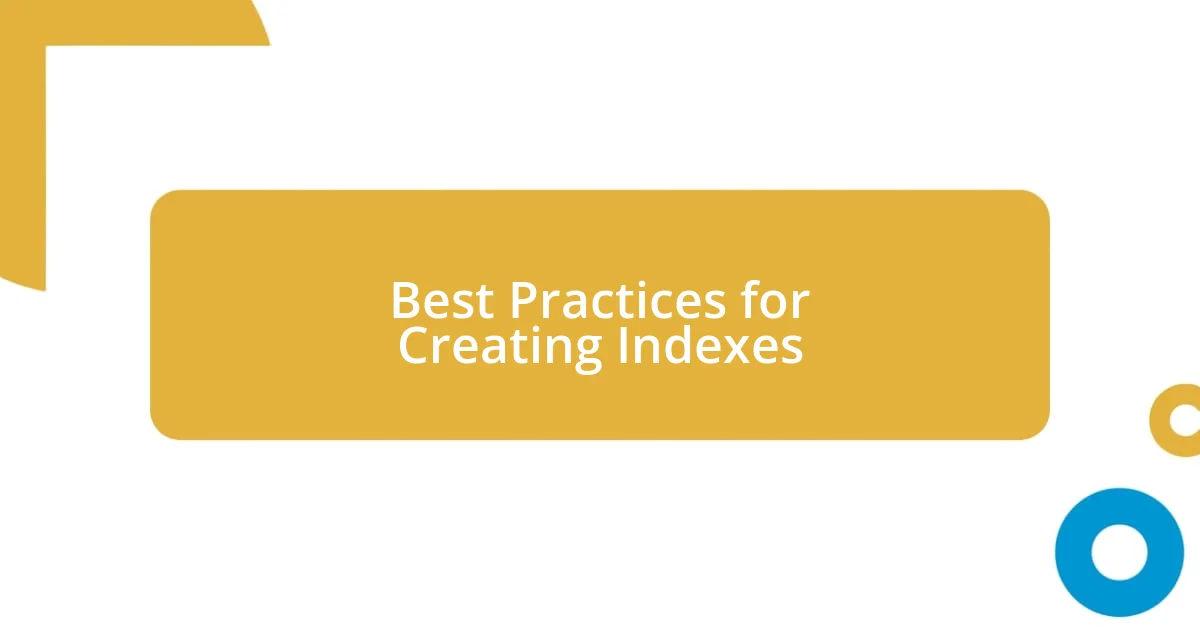
Best Practices for Creating Indexes
Creating effective indexes is crucial, but knowing where to start can be daunting. One of my go-to strategies is to prioritize indexing on columns that are frequently used in WHERE clauses or JOIN operations. I remember a project where I focused on optimizing search functionalities, and the significant improvement in speed felt like uncovering a hidden gem in a treasure hunt. It’s fascinating how the right indexes can turn an unwieldy query into a swift, efficient operation.
It’s also essential to avoid over-indexing; while it might be tempting to index every column, this can lead to increased overhead during data modifications. I learned this lesson the hard way after creating excessive indexes on a large table, which slowed down insert operations dramatically. Have you found the balance between having enough indexes and not too many? It requires careful consideration, but when you strike that balance, the performance gains can be astonishing.
Testing and monitoring indexes is another key practice. I often utilize a method called “index usage statistics” to see how often my indexes are being utilized. There was a time when I discovered an unused index that I had spent hours creating—talk about a gut punch! But this insight led me to refine my approach, ensuring that each index I create serves a purpose. Regularly revisiting and tuning your indexes can make all the difference in maintaining optimal database performance over time.
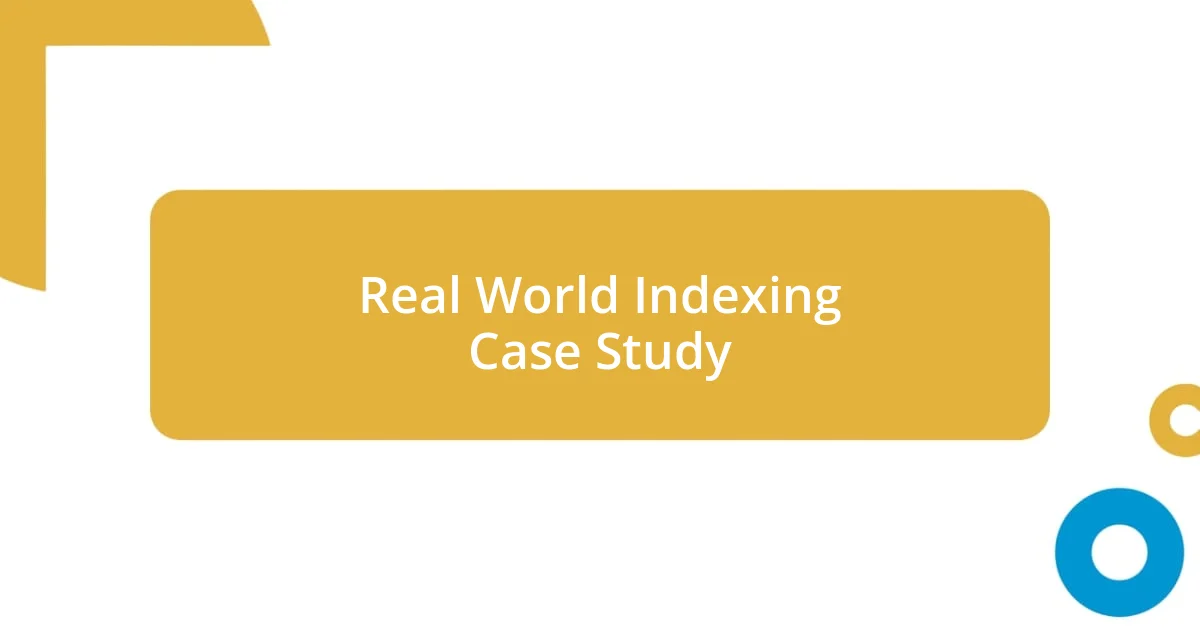
Real World Indexing Case Study
One of my most enlightening experiences with indexing came during a project where we needed to improve the performance of a customer query system for an e-commerce website. After doing some digging, I found that the majority of slow responses stemmed from searching through a massive products table. By implementing a composite index on both the product category and price, I witnessed the query times shrink dramatically—from several seconds down to milliseconds. It was as if I had opened a floodgate, and the satisfaction from that moment was truly exhilarating.
In another instance, I was working on a data analytics application which had a particularly heavy report generation function. Initially, our indexing strategy was quite minimal, leading to responses that were painfully slow. However, after analyzing the most frequent queries, I identified key attributes that were not indexed. With a few thoughtful adjustments, including adding indexes on date ranges and status fields, we decreased report generation times by over 80%. It reminded me of a puzzle coming together—a feeling of accomplishment that’s hard to beat.
Reflecting on these experiences, it’s clear that the right indexing strategy does not just accelerate queries; it transforms the user experience altogether. Have you ever felt the frustration of waiting for a slow query to complete? The transition from inefficiency to seamless operation is not just technical; it’s emotional. Each time we optimize, we create value—not just in terms of speed, but also in user satisfaction and trust. Wouldn’t you agree that unlocking performance gains through smart indexing is one of the most rewarding aspects of database management?
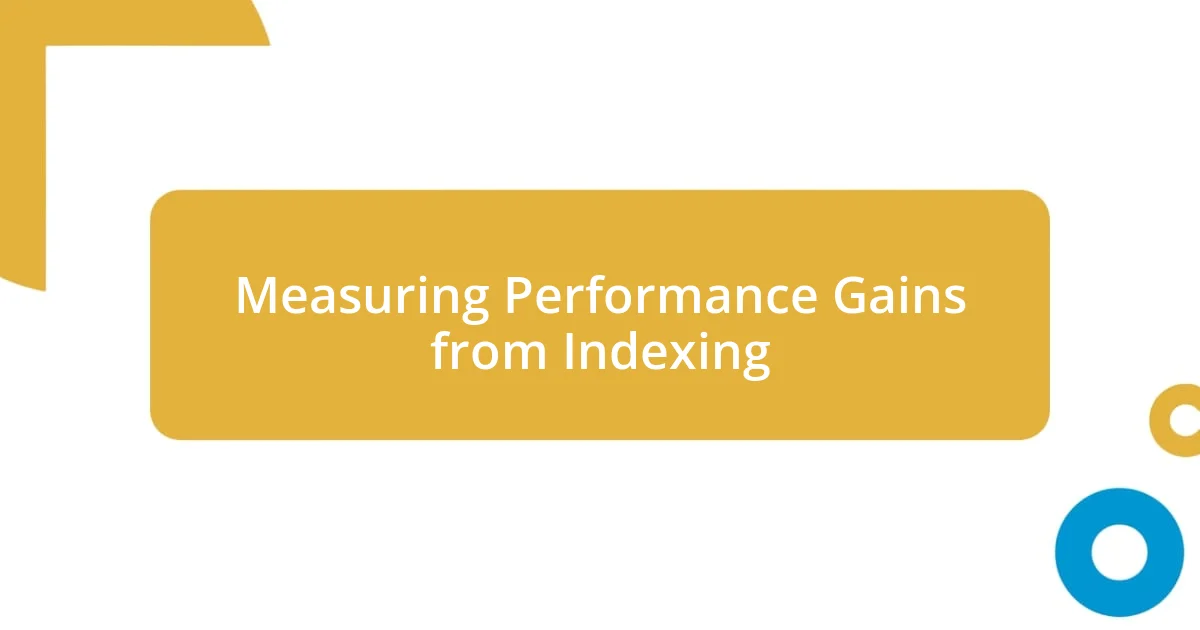
Measuring Performance Gains from Indexing
To measure performance gains from indexing effectively, I often begin by conducting a thorough analysis of query performance before and after indexing. I recall a particular time when I meticulously tracked query execution times using profiling tools. The contrast was astounding; seeing an initial response time of ten seconds drop to under one second after applying suitable indexes is something I won’t forget. Have you ever experienced such a transformative moment? It’s like night and day.
Another method I find invaluable is analyzing database metrics, such as disk I/O and CPU usage, both prior to and post-indexing. During one of my projects, the realization that I had significantly reduced resource consumption—evidenced by drops in I/O operations—was incredibly gratifying. I can’t stress enough how rewarding it feels to see numbers on a dashboard shift from alarming to optimal, almost like watching a deflated balloon fill with air again. It also helps solidify the understanding that my efforts in indexing directly contributed to smoother application performance.
Lastly, user feedback plays a vital role in quantifying the success of indexing efforts. I remember gathering insights from end-users who expressed their frustration with slow response times before optimizations were made. When I followed up after implementing the new indexes, their relief and appreciation were palpable. It stirred a sense of fulfillment in me, knowing I had a hand in enhancing their experience. Are there metrics you prioritize when measuring performance gains? I find that combining hard data with user sentiment creates a comprehensive picture of how indexing can truly drive results.














